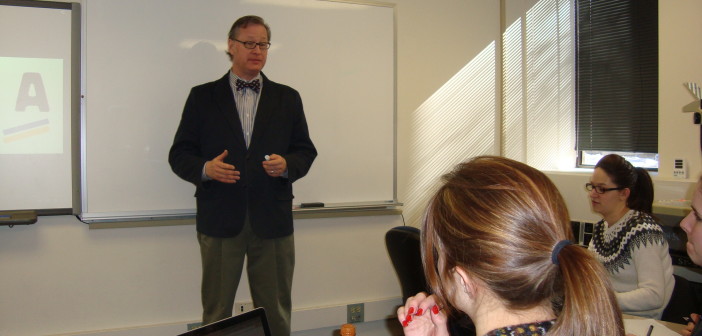Over the course of less than a year, Dr. Gregory Wolf, Dennis and Jean Bauman, Professor in the Humanities and professor of German, has received a total of three grants from the German government. These grants have allowed him to travel and learn new things about German culture.
Last summer, Wolf received the first of these grants, the prestigious Fulbright grant, which was targeted at American professors of German studies. This grant covered all expenses for Wolf to travel to Germany and stay with a host family while he worked at the University of Leipzig with approximately 14 other recipients. While there, Wolf studied contemporary German society via film studies, cultural studies and a number of other contemporary approaches.
Overall, Wolf explains that he and the rest of the grant recipients were “exploring how interdisciplinary subjects are studied in Germany.”
Following this, Wolf then received his second grant this past fall, which he explains was “a very comprehensive grant from the German government” that allowed him to travel to Washington D.C. and attend a three-day conference at Georgetown University. At this conference, Wolf and approximately 30 other recipients worked intensive 10-plus hour days, focusing on German studies in the U.S. and discussing how to create text-centered curricula.
“How do we take a textural approach to teaching culture and language to students?” said Wolf, explaining that there are any number of ways that students, and people in general, can perceive and interpret any kind of text. “By learning about German history, society and politics, students have a context in which to situate the text, film or art work,” said Wolf. “Gradually they learn to compare and contrast artifacts from different epochs and make connections to their own situation and their own culture.”
With his third and final grant from the German government, Wolf was able to go to another three-day workshop in Philadelphia in November, which he explains aimed to “develop materials which will promote the teaching of German to high school students.”
According to Wolf, this committee of approximately 10 people took a proactive approach to German programs across the county. The committee created films, posters, and brochures for advocacy programs in an effort to get students interested in teaching German so that future programs might be well-staffed with the best German teachers available.
“We should be thinking about our very best students to teach,” said Wolf, explaining that teachers and professors should encourage their best students to pursue careers in teaching more often.
Brittany Kancauski, a German major and senior, is one such student who is pursuing a career in German education.
Kancauski explains that she realized she wanted to teach German when she was in high school and that Wolf has been an advocate for her career path during her time studying with him. She explained that he has helped her build up her resume and “create a culture of German” that helps show what she can do.
Overall, Wolf says that these seminars, conferences and workshops have allowed him to stay up-to-date on trends and contemporary findings which, in turn, allow him to progress his personal classes without repeating the same information and activities every year.
“The need to be aware of contemporary knowledge is a never-ending process,” Wolf said. “Staying abreast of these trends has made me better so that my students can profit.”
As an advocate for student-centered classes, as well as opportunities to work with his students on undergraduate research, Wolf says that, “I apply for (these grants) when I know there is a tangible benefit to my students.”
Kancauski explains that Wolf puts a lot of expectations on his students to make sure that they are doing what they need to be doing and understanding the material. “If it’s something that we’re working with that we really understand, (that’s) beneficial because then we’re more apt to discuss it,” she explains.
“You have to empower the student to have the confidence and ability,” Wolf says. “Students are creative and approach their daily lives with innovative ways to solve problems. In my classes I encourage and attempt to foster that same creativity.”
Since starting at North Central in 2005, Wolf has worked to restructure the school’s German program and make it an all-encompassing experience for the students.
“I tried to usher in a pedagogically modern program that presented an interdisciplinary view of Germany,” he explains. “I wanted to make the program a communicative program.”
Along with these achievements, Wolf also runs the yearly D-term trips to Germany with his students, which he says gives them a chance to experience another culture for a short period of time. Wolf says that these trips are a “trans-formative experience” that allow the students to feel comfortable in another culture while also reflecting on their identities as Americans.
Kancauski, who attended the trip to Germany with Wolf this past winter, says that, “It’s something that I’ve always wanted to do, and until I got back I didn’t realize how valuable it was for my (career in) teaching.”
In his almost 10 years at North Central, Wolf has worked to stay informed and up-to-date on German society, as well as new teaching trends, in an effort to help his students in many different ways. These grants have helped him do just that.

